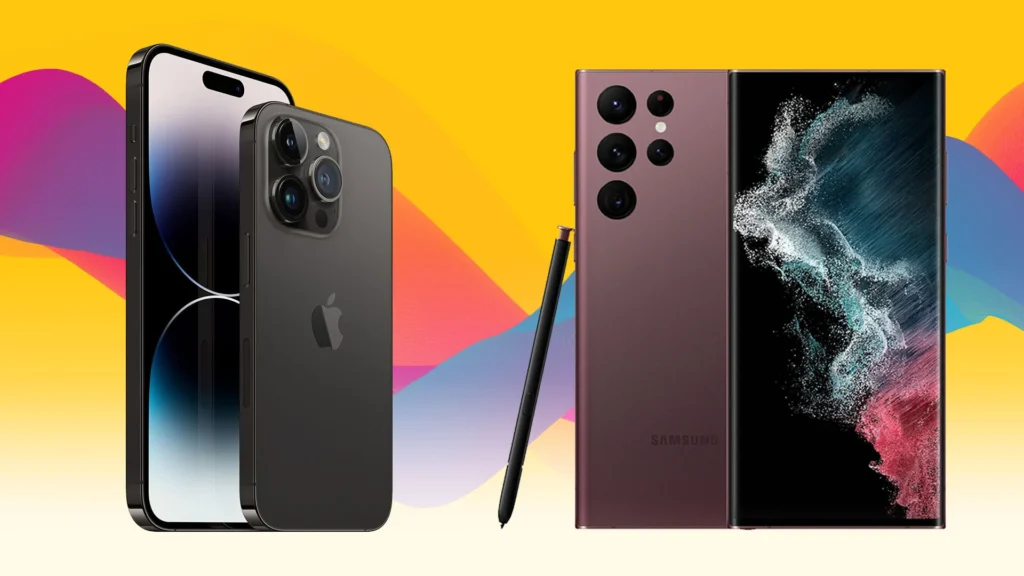Iphone vs Samsung

The iPhone vs. Samsung debate is one that often comes down to personal preference, as both brands offer top-tier smartphones with distinct features. Here’s a breakdown to help you choose which is best for you:
iPhone (Apple):
Pros:
- User Experience: iPhones offer a smooth, seamless user experience with iOS. The interface is clean, intuitive, and optimized, ensuring smooth performance.
- Ecosystem: iPhones integrate very well with other Apple products (MacBooks, iPads, Apple Watches, etc.), making it easier to sync your devices.
- Build Quality: Apple devices are known for their premium build, attention to detail, and longevity. They often last longer than most Android devices.
- Security and Privacy: Apple puts a strong emphasis on user privacy and security. iOS is generally considered more secure than Android.
- App Quality: Apps on iOS are often better optimized and can perform smoother compared to their Android counterparts.
- Software Updates: Apple provides longer software support, with iPhones receiving updates for several years.
Cons:
- Price: iPhones are often more expensive than their Samsung counterparts with similar specifications.
- Customization: iOS is less customizable compared to Android. You are limited to Apple’s design choices.
- Limited Hardware Choices: Apple offers only a limited selection of models, which may not suit everyone’s needs.
- No Expandable Storage: iPhones do not support microSD cards, so you’re stuck with the internal storage you buy.
Samsung (Android):
Pros:
- Variety of Models: Samsung offers a wide range of smartphones at different price points, so you have more flexibility in choosing the right phone for your needs.
- Display Quality: Samsung’s AMOLED screens are known for their incredible color accuracy, deep blacks, and overall vibrant display quality.
- Customization: Samsung phones run Android, which is highly customizable. You can tweak almost every aspect of the interface and even use third-party apps as defaults.
- Expandable Storage: Many Samsung models offer microSD card slots, allowing you to expand your storage.
- Innovative Features: Samsung tends to be at the forefront of new technologies, like foldable screens, high-refresh-rate displays, and advanced camera features.
- Price Range: Samsung provides a wide spectrum of pricing, making it easier to find a phone that fits your budget.
Cons:
- Software Updates: Although Samsung has improved its software update policy, Android devices, in general, receive fewer years of support than iPhones.
- Bloatware: Samsung devices often come with pre-installed apps and features that some users find unnecessary.
- User Interface (One UI): While many like Samsung’s One UI, it can feel heavy and less smooth compared to iOS.
- Fragmentation: The Android ecosystem is more fragmented, which means that certain apps or updates might not work consistently across all Samsung devices.
Which Is Best for You?
- Choose iPhone if:
- You value a consistent, seamless user experience.
- You’re already invested in the Apple ecosystem (e.g., you have an Apple Watch, MacBook, or iPad).
- You want long-term software support and enhanced privacy/security features.
- You’re willing to pay a premium for a refined, high-quality product.
- Choose Samsung if:
- You want a wide variety of phones across different price points.
- You enjoy customizing your phone and need expandable storage.
- You love having the latest display technology and innovation (e.g., foldable phones, high refresh rate screens).
- You prefer the flexibility and openness of Android.
Conclusion:
Both iPhone and Samsung offer excellent phones, but which is “best” ultimately depends on your preferences. iPhone is ideal for those looking for consistency, premium build quality, and deep integration within the Apple ecosystem. Samsung is perfect for those who prefer customization, advanced display tech, and a wider range of options across various price points.
Both brands cater to different user needs, so it really comes down to what features matter most to you.